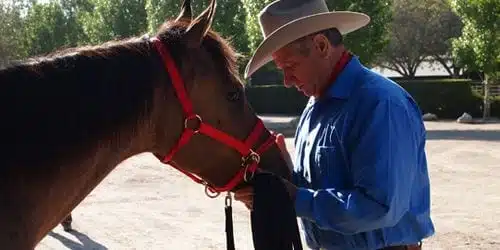
“How many people do you trust?” Monty Roberts asks a couple of young war veterans struggling with PTSD. When one shrugs, “Not many,” Roberts nods. “It’s a good way to be in your position,” he says. “Because you’re still fighting a war.”
It’s a simple exchange, not even a minute’s worth of Horse Sense and Soldiers. But the looks on all three faces explain the significance of this affirmation. For years, Spc Alejandra Maria Sanchez has been frustrated, angry, and unable to communicate with her parents, who worry that she’s returned from Iraq a changed person. The distance between them is illustrated in some obvious framing by the camera: Alejandra sits outside on the porch, visible through the window while her parents sit inside. “She came home safe,” says her father, “I mean, in one piece. But she’s not my daughter.”
If her family and doctors have been trying to bring her back, to make her the person they want or imagine, Monty Roberts, by contrast, accepts her exactly where she is. And then he offers her choices. It’s the same way he deals with horses. The “original horse whisperer” who inspired Redford Redford’s 1998 movie, Roberts seems preternaturally calm, visibly sensitive to the needs of people and animals with whom he interacts. Watching Joe looking just a touch overeager as he’s riding a horse, Roberts instructs: “You don’t have to demand, just request.” He’s reassuring and gentle and also utterly right.
This is how the world works, when you’re not at war. You can’t expect human beings to meet your expectations or never to betray you, observes Roberts. You can only “take what comes.” You respond to the creatures in the world with patience and no expectations. You can begin anew, each moment, without regret or trepidation, with frustration that your needs aren’t met exactly when you feel them. You can sit still, you can share and understand space. And you can appreciate what someone else is saying because you can hear him, because you are communicating.
Working with damaged war veterans seems an obvious path for Roberts, who, in addition to working with horses, also works with “troubled teens, prison convicts, and abused women” (here a series of illustrative archival images suggest these are all mutually exclusive populations). Though he’s called a whisperer, he’s primarily a terrific listener, attentive to each twitch of a worried horse’s ear, each flick of a tail or quiet snort. These are means of communication, and he takes them seriously, just as he takes serious what the veterans say to him.
This seems different from the soldiers’ situations at home, where their parents, wives, and girlfriends worry. They also resent and fear and cry, feel like failures, feel like they’ve lost control or are asked to take on too much. Summer, Joe’s wife, notes that recently, “He is more shut off now than he ever was. He’s a calmer, but I think that’s because of the medication not because of the treatment.” Her own tension is palpable, in just 20 seconds on screen.
Horse Sense and Soldiers doesn’t detail the sorts of “treatment” Joe, Kyle, and Alejandra are receiving, what’s working or not, how hard it is to get access to it, whether through the VA or some other organization, or even how long they’ve been at it. What’s important — for them and apparently for the show — is that they remain pained, as PTSD remains an elusive, tangled, and shifting condition.
The show does set up what appears to be a very strange circumstance for Roberts: he has just four days to work with each soldier. They arrive at his Solvang, California, Flag Is Up Farms and set to work straight away: shake hands and boom, in the ring with a horse. The reason for this deadline is never explained (“I don’t feel like I have enough time,” he says), but it does what reality TV likes to have done — it sets up an intertitled Day One, Day Two, etc. structure, and allows the narrator to suggest that a clock is ticking and something terrible might result when it stops. None of this makes much sense, frankly, given the deliberate, peaceful process Roberts offers his students.
That process leads to a range of effects, with some moments of anxiety, some memories of bad places in Iraq, and even a time-out so the show can explain Roberts’ own difficult background. The son of a horse trainer who, Roberts says, used to beat both his horses and his son, Roberts was, as a teenager, moved to think about killing his tormenter. But his eighth grade teacher, a nun, encouraged him not to become “the violent person that he is,” but instead to pursue his own “potentials.” Here Roberts shows himself to be an effective storyteller as well as a strategic listener. (Apparently there is disagreement within Roberts’ own family as to whether his father was abusive, but the show pays this no mind, but rather illustrates his story with trite reenactment footage showing a shadowy, teenaged Roberts approaching his father, shotgun in hand.)
As Roberts lets go of his own story and turns instead to the veterans, their work together — concerning trust, whether earnest or performed, the latter leading to the former when the training goes right. Each of the soldiers has a moment of revelation, per the formula of such a reality TV hour, but their interactions with the horses are genuinely inspiring to see. Time — and attention — can heal troubled horses, and people too.

